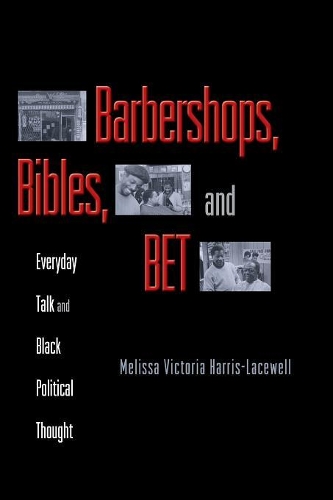
Barbershops, Bibles, and BET: Everyday Talk and Black Political Thought
(Paperback)
Publishing Details
Barbershops, Bibles, and BET: Everyday Talk and Black Political Thought
By (Author) Melissa Harris-Perry
Princeton University Press
Princeton University Press
3rd October 2006
United States
Classifications
Professional and Scholarly
Non Fiction
Ethnic studies / Ethnicity
Popular culture
320.508996073
Winner of American Political Science Association: Race, Ethnicity and Politics Award 2005
Physical Properties
Paperback
368
Width 152mm, Height 235mm
510g
Description
What is the best way to understand black political ideology Just listen to the everyday talk that emerges in public spaces, suggests Melissa Harris-Lacewell. And listen this author has--to black college students talking about the Million Man March and welfare, to Southern, black Baptists discussing homosexuality in the church, to black men in a barbershop early on a Saturday morning, to the voices of hip-hop music and Black Entertainment Television. Using statistical, experimental, and ethnographic methods Barbershops, Bibles, and B.E.T offers a new perspective on the way public opinion and ideologies are formed at the grassroots level. The book makes an important contribution to our understanding of black politics by shifting the focus from the influence of national elites in opinion formation to the influence of local elites and people in daily interaction with each other. Arguing that African Americans use community dialogue to jointly develop understandings of their collective political interests, Harris-Lacewell identifies four political ideologies that constitute the framework of contemporary black political thought: Black Nationalism, Black Feminism, Black Conservatism and Liberal Integrationism. These ideologies, the book posits, help African Americans to understand persistent social and economic inequality, to identify the significance of race in that inequality, and to devise strategies for overcoming it.
Reviews
Winner of the 2005 Best Book Award in Racial and Ethnic Political Identities, Ideologies and Theories Category; Race, Ethnicity, and Politics Section of the American Political Science Association Co-Winner of the 2005 W.E.B. Du Bois Book Award, National Conference of Black Political Scientists "[A]n invaluable addition to the African American politics canon... [This book] is well written and original in its conception, and it represents a remarkable achievement. It will undoubtedly generate more work in the future that probes the sources and character of black political thought, as well as the ability of ordinary black folk to think for themselves."--Richard Iton, Perspectives on Politics "The book convincingly demonstrates that there are many aspects of black ideology and opinion, a fact that is necessarily overlooked in conventional analyses of voting patterns, partisan affiliation, or interest group involvement."--Choice "The book impressively weaves multiple research methods to provide a comprehensive understanding of black political ideology... By following Harris-Lacewell's example of paying close attention to the intersection of race and other forms of social stratification, we could better understand how the meaning of blackness and the 'Black agenda' is constructed within the black community."--Patricia Hill Collins, Ethnic and Racial Studies
Author Bio
Melissa Victoria Harris-Lacewell is Assistant Professor of Political Science at the University of Chicago.
